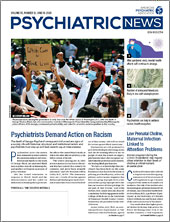Maryland residents experiencing a psychiatric emergency—that’s anyone anywhere in the “Old Line” State—can find “virtual urgent care” through the Sheppard Pratt Health System in Towson, Md.
The Sheppard Pratt Virtual Crisis Walk-In Clinic is a novel extension of psychiatric/medical care in the midst of a global pandemic that has transformed telehealth from a sometimes used tool in the physician toolkit—mainly reserved for rural areas of the country or other unusual circumstances—to the common currency of nearly every consult that does not require hospitalization.
“With the spread of COVID-19, we realized many people may be cut off from their usual source of care” as hospitals and the medical community mobilize to meet the pandemic, said Harsh Trivedi, M.D., CEO of Sheppard Pratt. “Our solution has been to use telehealth to extend urgent care into the community to anyone in the state experiencing a psychiatric emergency. We are used to evaluating 6,000 to 7,000 patients in our walk-in clinic every year. Now people can get the same timely care at Sheppard Pratt virtually.”
The Virtual Crisis Walk-In Clinic is available to any individual living in Maryland. It is open Monday to Friday, 10 a.m. to 9 p.m., and Saturdays, 1 p.m. to 4 p.m.
Deepak Prabhakar, M.D., M.P.H., director of outpatient services at Sheppard Pratt, told Psychiatric News that in the first four days of the clinic’s virtual existence (beginning on April 6), more than 40 people received consults. These individuals—they do not have to be patients at Sheppard Pratt’s outpatient clinics—received an evaluation and then connected with therapists.
He said the
clinic website surfaces in common Google searches. Once at the website, prospective patients can call the Sheppard Pratt outpatient services phone number or fill out an online form requesting a consult. Within minutes, Prabhakar and staff with the clinic receive an email about a new patient, who will then be contacted and connected with an online therapist. Individuals needing medication, or refills of medication, receive a consult with a physician or nurse practitioner.
He said a handful of individuals have been admitted to the hospital. The clinic also has a mobile team that can transport individuals without transportation from their homes to the hospital in Towson.
The Virtual Crisis Walk-In Clinic participates with Maryland Medicaid and Medicare and major insurers. “As a mission-based organization we have a mechanism for taking in patients who are uninsured,” Prabhakar said.
Sheppard Pratt’s virtual walk-in clinic is one example of the way hospitals and health systems are adapting to the unprecedented challenge of COVID-19. The American Hospital Association’s (AHA) Center for Health Innovation microsite lists a variety of steps being taken by health systems on their own or in tandem with the private sector. AHA’s Update and Resources on Novel Coronavirus (COVID-19) offers tools and resources for hospitals and health systems.
At Sheppard Pratt, patients using the virtual clinic report COVID-related problems with mental health, as well as exacerbations of psychiatric disorders that pre-date the pandemic. A typical presenting complaint, Prabhakar said, might be something like this: “I don’t know if I can go through this. I’ve had depression and now my treatment has been disrupted.”
He said, “A quarter of our population [in Maryland] has always been struggling with these issues, and now they are being buried by COVID. Everyone is paying attention to COVID. But pandemic or no pandemic, the fact that such a large population is at risk of losing employment and access to care further complicates their disorders.” ■
The website for the Sheppard Pratt Virtual Crisis Walk-In Clinic is
here.
The website of the American Hospital Association Center for Health Innovation is
here.
The AHA’s Update and Resources on Novel Coronavirus (COVID-19) is posted
here.


